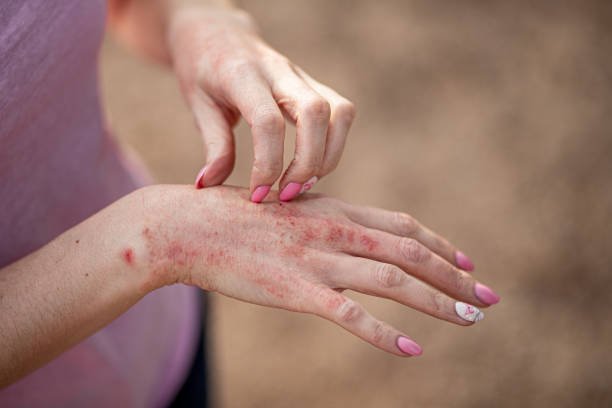Psoriasis :-
Psoriasis is an immune-mediated disease, which means that your body’s immune system starts overacting and causing problems. If you have psoriasis, immune cells become active and produce molecules that set off the rapid production of skin cells. This is why skin in people with the disease is inflamed and scaly.
According to one study published in 2021, around 7.5 million American adults ages 20 and older have psoriasis — a 3% prevalence rate (occurrence of a condition). By race and ethnicity, the prevalence rates are:
- 3.6% of white people
- 3.1% of non-Hispanic people, including multiracial people
- 2.5% of Asian people
- 1.9% of Hispanic people, including Mexican American people
- 1.5% of Black people

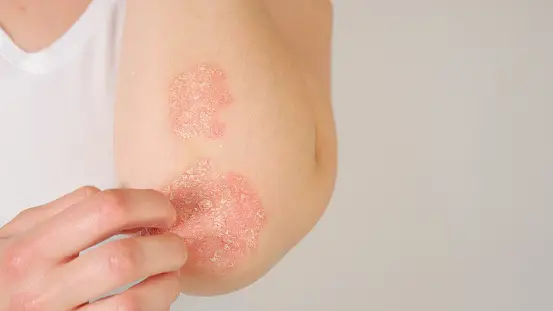

Where does psoriasis usually start?
Scales typically develop on joints, such as elbows and knees. However, they may develop anywhere on your body, including the:
- hands
- feet
- neck
- scalp
- face
Less common types of psoriasis affect the:
- nails
- mouth
- area around the genitals
It’s commonly associated with several other conditions, including:
- type 2 diabetes
- inflammatory bowel disease
- heart disease
- psoriatic arthritis
- anxiety
- depression
What are the different types of psoriasis?
Plaque psoriasis :-
Plaque psoriasis common occurs in childhood . This type of psoriasis causes small pink or violet spots. The most common sites for guttate psoriasis include your torso, arms, and legs. These spots are rarely thick or raised like plaque psoriasis.
The American Academy of Dermatology (AAD) estimates that about 80-90 % of people with the condition have plaque psoriasis. It causes red, inflamed patches on light skin tones and purple or grayish color or darker brown patches on skin of color — making it harder to diagnose in people of color.
These patches are often covered with whitish-silver scales or plaques and are often more severe on the skin of color These plaques are commonly found on the elbows, knees, and scalp.
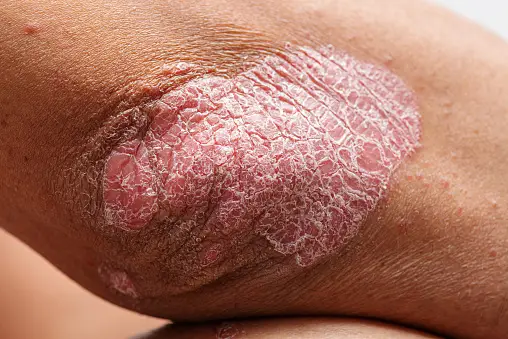
Guttate psoriasis :-
Guttate psoriasis commonly occurs in childhood. This type of psoriasis causes small pink or violet spots. The most common sites for guttate psoriasis include your torso, arms, and legs. These spots are rarely thick or raised like plaque psoriasis.

Pustular psoriasis :-
Pustular psoriasis is more common in adults. It causes white, pus-filled blisters and broad areas of red or violet —depending on skin tone — inflamed skin. It can appear as a more intense violet color on darker skin tones. Pustular psoriasis is typically localized to smaller areas of your body, such as the hands or feet, but it can be widespread.
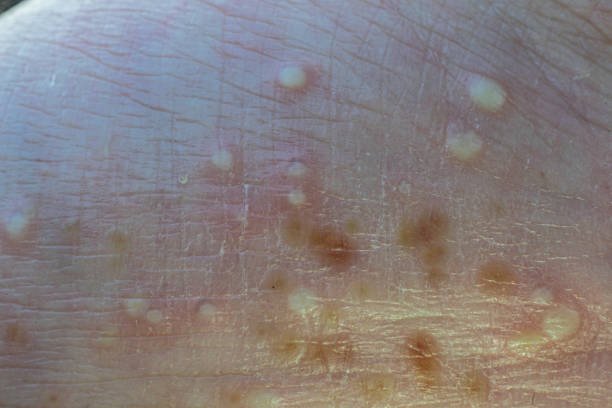
Inverse psoriasis :-
Inverse psoriasis causes bright areas of red, shiny, inflamed skin. Patches of Inverse psoriasis develop under your armpits or breasts, in your groin, or around skinfolds in your genital.
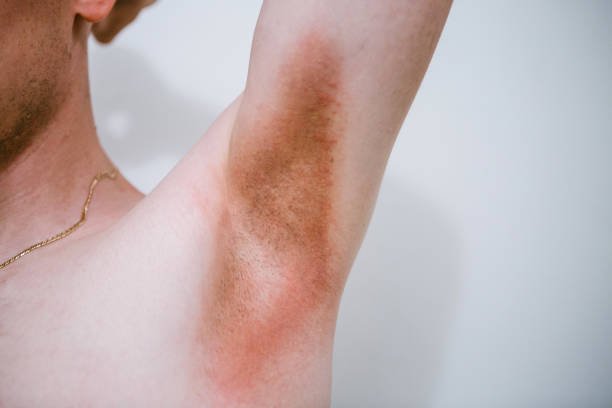
Erythrodermic psoriasis :-
Erythrodermic psoriasis is a severe and very rare type of psoriasis, according to the National Psoriasis Foundation.
This form often covers large sections of your body at once. The skin almost appears sunbured. Scales that develop often slough off in large sections or sheets. It’s not uncommon for you to run a fever or become very ill with this form of psoriasis.
This type can be life threatening, so it’s important that you make an appointment with a healthcare professional immediately.

What are the symptoms of psoriasis?
Psoriasis symptoms differ from person to person and depend on the type of psoriasis you have. Areas of psoriasis can be as small as a few flakes on your scalp or elbow, or cover the majority of your body.
The most common symptoms of plaque psoriasis include:
- raised, inflamed patches of skin that appear red on light skin and brown or purple on dark skin
- whitish-silver scales or plaques on the red patches or gray scales on purple and brown patches
- dry skin that may crack and bleed
- soreness around patches
- itching and burning sensations around patches
- thick, pitted nails
- painful, swollen joints
Not every person will experience all these symptoms. Some people will experience entirely different symptoms if they have a less common type of psoriasis.
How do you know if you have psoriasis?
Most people with psoriasis go through “cycles” of symptoms. The condition may cause severe symptoms for a few days or weeks, and then the symptoms may clear up and be almost unnoticeable.
Then, in a few weeks or if made worse by a common psoriasis trigger, the condition may flare up again. Sometimes, symptoms of psoriasis disappear completely.
When you have no active signs of the condition, you may be in “remission ” That does not mean psoriasis will not come back, but for this period of time, you’re symptom-free.
What causes psoriasis to start?
Doctors are unclear as to what causes psoriasis. However, thanks to decades of research, they have a general idea of two key factors:
- genetics
- the immune system
Immune system :-
Psoriasis is autoimmune conditions . Autoimmune conditions are the result of your body attacking itself. In the case of psoriasis, white blood cells known as T cells mistakenly attack your skin cells.
Generally, in the body, white blood cells are deployed to attack and destroy invading bacteria and mount a defense against infections. This mistaken autoimmune attack causes the skin cell production process to go into overdrive. The sped-up skin cell production causes new skin cells to develop too quickly. They are pushed to the skin’s surface, where they pile up.
This results in the plaques that are most commonly associated with psoriasis. The attacks on the skin cells also cause red, inflamed areas of skin to develop.

Genetics :-
Some people inherit genes that make them more likely to develop psoriasis. If you have an immediate family member with the skin condition, you are at an increased risk Trusted of developing psoriasis, according to research published in 2019.

What are the triggers of psoriasis?
External “triggers” may start a new bout of psoriasis. These triggers are not the same for everyone. They may also change over time for you.
The most common triggers for psoriasis include:
Stress :-
Unusually high stress may trigger a flare-up. If you learn to reduce and manage your stress, you can reduce and possibly prevent flare-ups.
Injury :-
An accident, cut, or scrape may trigger a flare-up. Injections, vaccines, and sunburns can also trigger a new outbreak.
Medications :-
Some medications are considered psoriasis triggers. These medications include:
- lithium
- antimalarial medications
- high blood pressure medication
Treatment options for psoriasis :-
Psoriasis has no cure. Treatments aim to:
- reduce inflammation and scales
- slow the growth of skin cells
- remove plaques
Psoriasis treatments fall into three categories:
Topical treatments :-
Creams and ointments applied directly to the skin can be helpful for reducing mild to moderate psoriasis.
Topical psoriasis treatments include:
- topical corticosteroids
- topical retinoids
- anthralin
- vitamin D analogues
- salicylic acid
- moisturizer
Diet recommendations for people with psoriasis
Food cannot cure or even treat psoriasis, but eating a nutrient-rich diet might help reduce your symptoms. These five lifestyle changes may help ease symptoms of psoriasis and reduce flare-ups:
Managing body weight
It’s unclear how weight interacts with psoriasis, but losing excess weight may also help in making treatments more effective. If you’re overweight, working toward reaching moderate weight , may help in reducing the severity of the condition.

Eating a heart-healthy diet
Reducing your intake of saturated fats, which are found in animal products, like meats and dairy, can be helpful in managing psoriasis.
It’s also important to increase your intake of lean proteins that contain omega-3 fatty acids, such as salmon, sardines. Plant sources of omega-3s, including walnuts ,flax seeds , and soybean, are also helpful sources, especially if you’re looking for plant-based options.

Avoiding trigger foods
Psoriasis causes inflammation. Certain foods can cause inflammation as well. Avoiding those foods might help improve symptoms. These foods include:
- red meat
- refined sugar
- highly processed foods
- dairy products
Drinking less alcohol
Alcohol consumption can increase your risk of a flare-up. Cutting back or quitting entirely can help lower your risk. If you have alcohol use disorder, your doctor can help you create a treatment plan.

Considering taking vitamins
Some doctors prefer a vitamin-rich diet to vitamins in pill form. However, even the healthiest eater may need help getting adequate nutrients. Ask your doctor if you should be taking any vitamins as a supplement to your diet.

Living with psoriasis
Having psoriasis can be challenging at times, but with the right approach, you can reduce flare-ups. These three areas will help you cope in the short and long term:
Diet
losing any excess weight to reach a moderate weight and eating a nutrient-dense diet can go a long way toward helping ease and reduce symptoms of psoriasis. This includes eating a diet rich in omega-3 fatty acids, whole grains, and plants.



Also, limiting foods that may increase inflammation in your body is important. These foods include refined sugars, dairy products, and highly processed foods.
Speak with your doctor about whether an anti-inflammatory diet is right for you.
Stress
Stress can be a trigger for psoria psoriasis source Trusted. Learning to manage and cope with stress may help you reduce flare-ups and ease symptoms. Consider trying the following to help reduce your stress level:
- meditation
- journaling
- breathing
- yoga
Emotional health
People with psoriasis are more likely to experience depression and self-esteem issues, according to research Trusted Source . You may feel less confident when new spots appear. Talking with your support network about how psoriasis affects you may be difficult. The constant cycle of the condition may also be frustrating.
All emotional issues associated with psoriasis are valid. Connecting with supportive resources is important for handling them. This may include speaking with a mental health professional or joining a support group for people with psoriasis.
